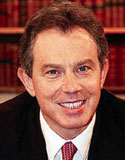Dr. Stephen Dyson, who will join the Wabash political science department this fall, has done extensive research on British Prime Minister Tony Blair. Dyson, who is finishing up a one-year appointment at St. Olaf's College, is a native Brit. He offered comment following Blair's re-election.
 The results of the general election in Britain, while returning Tony Blair's Labour Party for a third consecutive term, mark a huge change in the political landscape. Since his election as Labour leader in 1994 Blair has dominated the scene, winning unprecedented majorities in national elections in 1997 and 2001.
The results of the general election in Britain, while returning Tony Blair's Labour Party for a third consecutive term, mark a huge change in the political landscape. Since his election as Labour leader in 1994 Blair has dominated the scene, winning unprecedented majorities in national elections in 1997 and 2001.
With his sharply reduced House of Commons majority of 67, Blair is no longer a hegemonic figure. While 67 is a reasonable majority in historical terms, and a third success is without precedent for Labour, Blair emerges as a damaged figure serving out the last months of his political career. Politics is all about momentum and authority.
With the healthy state of the economy and the large investments in public services made by the government, Labour should have been looking at a majority of 150 plus, all other things being equal. In this context, 67 represents an unhappy number, and a sign that Blair's leadership is stalled. In terms of authority, Labour members of Parliament, who in the last two elections felt they had been elected because of Blair, now feel that they were elected in spite of their leader, and this radically reduces Blair's freedom of maneuver.
The majority of the public, and many members of the Labour party, opposed the war in Iraq and Blair's support of President Bush. The recent release of documents showing Blair had received but not released legal advice that the war might not have been legal, and that he had made a commitment to Bush much earlier than had been publicly acknowledged, re-ignited the Iraq issue and certainly cost Blair seats in the election.
 Indeed, the Prime Minister was fortunate in facing an impoverished Conservative Party opposition still in a post-Thatcher funk, reflected in the fact that while voters disserted Labour in droves, they did not swing directly to the Conservatives but rather voted for the minority Liberal Democrats or for a variety of independents. One of the most poignant of these was Reg Keys, who stood against the Prime Minister in the Sedgefield constituency and whose son was killed in Iraq. Keys won 10 percent of the vote, and, sharing a stage with the Prime Minister, made an emotional concession speech denouncing the war and what he termed the shifting justifications for it offered by Blair.
Indeed, the Prime Minister was fortunate in facing an impoverished Conservative Party opposition still in a post-Thatcher funk, reflected in the fact that while voters disserted Labour in droves, they did not swing directly to the Conservatives but rather voted for the minority Liberal Democrats or for a variety of independents. One of the most poignant of these was Reg Keys, who stood against the Prime Minister in the Sedgefield constituency and whose son was killed in Iraq. Keys won 10 percent of the vote, and, sharing a stage with the Prime Minister, made an emotional concession speech denouncing the war and what he termed the shifting justifications for it offered by Blair.
Keys pointedly referred to the precise number of British service people killed in Iraq, a figure which Blair had seemed unsure of in an earlier campaign appearance. The Prime Minister struggled to retain a neutral expression during the speech, and one can only guess as to his thoughts at that moment.
Blair will now test the water in the House of Commons, and seek to judge how much of his authority remains. He will try to avoid an unseemly early exit, and the appearance of being pushed out, but the consensus is that it is merely a matter of time until Blair resigns and hands over the Premiership to his long time rival, Chancellor of the Exchequer Gordon Brown.
In many ways, the decline of Tony Blair is a sad denouement for a politician of immense talent and radical inclinations, who at one point had seemed destined for a place in the very top rank of British political figures.